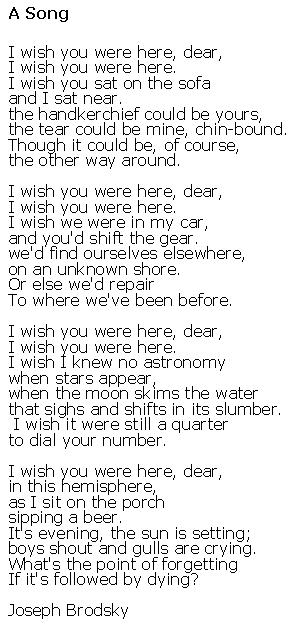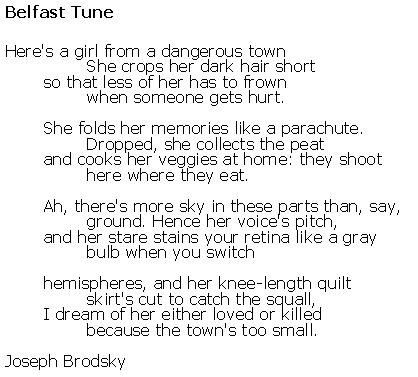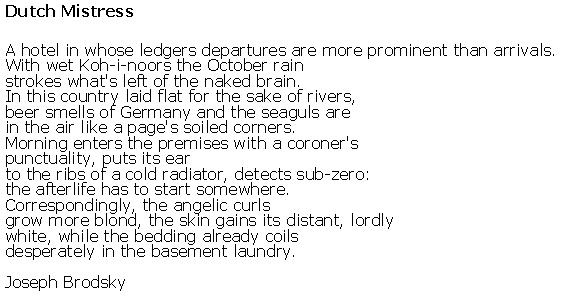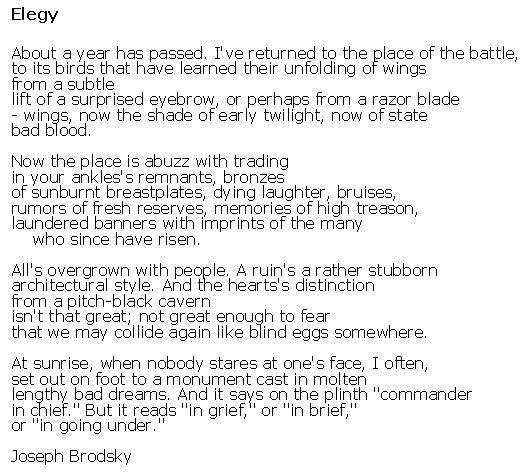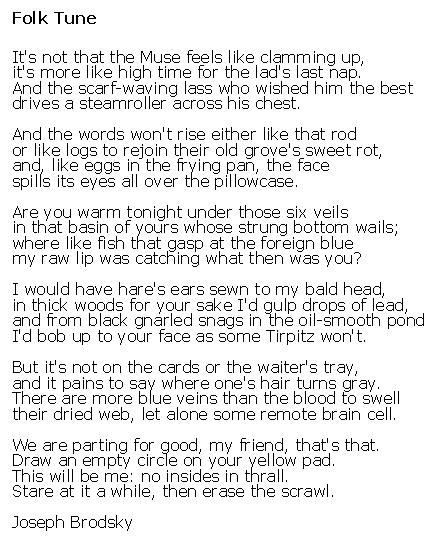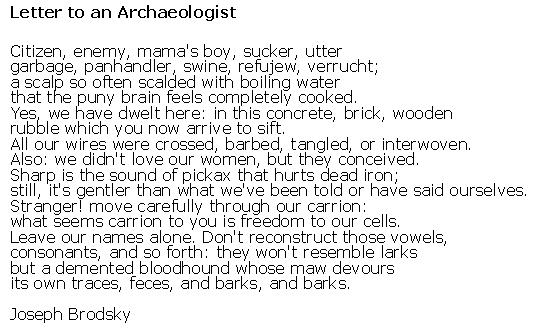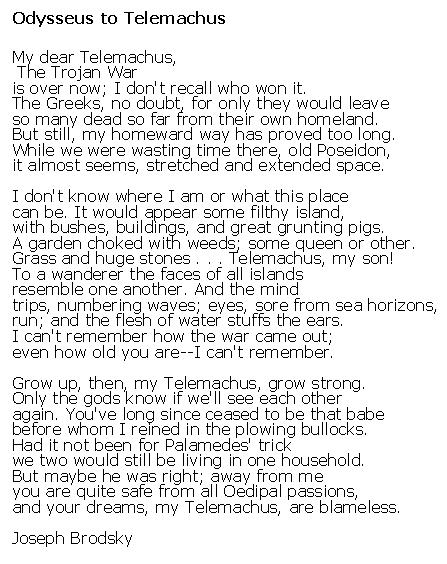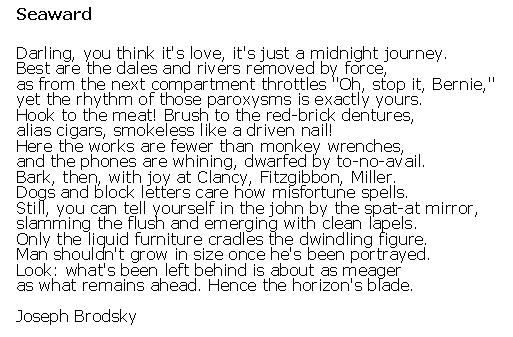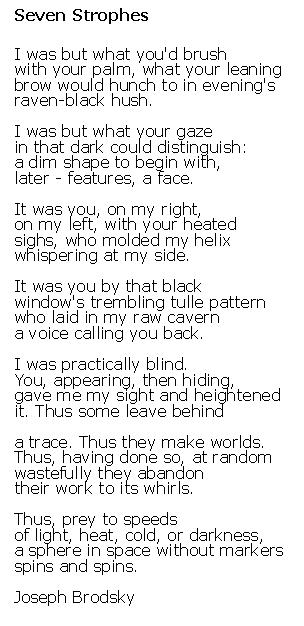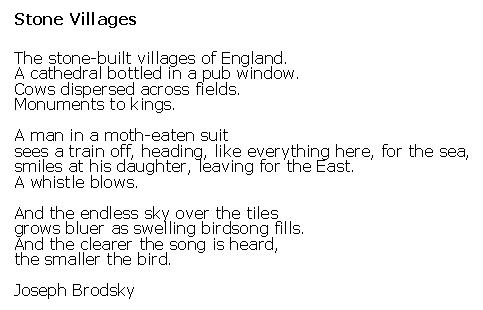Источник: http://www.argotistonline.co.uk/Brodsky%20interview.htm
Кому-то позарез нужен Бродский на испанском. Пожалуйста...
Joseph Brodsky
A EUGENIO
/En cualquier elemento el hombre
es tirano, prisionero o traidor...
A. Pushkin/
Yo estuve en Mexico, escale las piramides
impecables moles geometricas
desparramadas por el istmo de Tehuantepec.
Quiero creer que las hicieron visitantes del cosmos
pues estas obras suelen edificarlas los esclavos
y el istm0 esta cubierto de hongos petreos.
Los idolos de arcilla son tan faciles
de falsificar que propician rumores.
Bajorrelieves varios, con cuerpos de serpientes
y el alfabeto indescifrable de una lengua
que ignoro siempre la conjuncion /o/.
їQue contarian si empezaran a hablar?
Nada. En el mejor de los casos, las victorias
sobre tribus vecinas y cabezas partidas.
Que la sangre del hombre vertida en el altar
del Dios del Sol le fortalece un mъsculo.
Que el sacrificio nocturno de ocho jovenes fuertes
garantiza el alba con mayor seguridad que un despertador.
De cualquier modo es preferible la sifilis o las fauces
mortiferas de aquellos unicornios de Cortes, al sacrificio.
Si te toca en suerte alimentar con tus ojos a los cuervos
es preferible que el asesino sea asesino y no un astronomo.
En general, sin esos espaсoles es muy poco probable
que hubiesen llegado a tener la certeza
de que alguna cosa les habia pasado.
Es aburrido vivir, querido Eugenio. Dondequiera que vas
la estupidez y la crueldad te siguen.
Me da pereza encerrar eso en versos.
Como dijo el poeta: «En cualquier elemento...».
ЎQue lejos vio desde sus marismas natales!
Yo agregaria: en cualquier latitud.
/1975/
/De "No vendra el diluvio tras nosotros" (Antologia 1960-1996)
Version de Ricardo San Vicente/
AMICUM-PHILOSOPHUM DE MELANCHOLIA, MANIA ET PLICA POLONICA
/(«Al amigo-filosofo, de la mania, de la melancolia y de la plica
polaca»: titulo de un tratado del siglo XVIII que se conserva en la
biblioteca de la Universidad de Vilnius. [Nota del autor.])/
Insomnio. Un trozo de mujer. Un vidrio
repleto de reptiles que se abalanzan hacia afuera.
La locura del dia se desliza del cerebelo
al cogote donde ha formado un charco.
En cuanto te meneas, el interior percibe
como en este lodo helado alguien
sumerge una pluma fina
y lentamente traza «maldicion»
con letra que se tuerce en cada curva.
El trozo de mujer con crema
suelta al oido palabras largas
como una mano en mugrientas greсas.
Y tъ en las sombras estas solo, sobre la sabana
denudo, como un signo zodiacal.
/1971/
/De "No vendra el diluvio tras nosotros" (Antologia 1960-1996)
Version de Ricardo San Vicente/
CANCIoN DE AMOR
Si te estuvieras ahogando, acudiria a salvarte,
a taparte con mi manta y a ofrecerte te caliente.
Si yo fuera comisario, te arrestaria y te
encerraria en una celda con la llave echada.
Si fueras un pajaro, grabaria un disco
y escucharia toda la noche tu trino agudo.
Si yo fuera sargento, tъ serias mi recluta
y, chico, te aseguro que te encantaria la instruccion.
Si fueras china, aprenderia tu idioma, quemaria
mucho incienso, llevaria tu ropa rara.
Si fueras un espejo, asaltaria el baсo de las seсoras,
te daria mi lapiz rojo de labios y te soplaria la nariz.
Si te gustaran los volcanes, yo seria lava
en constante erupcion desde mi oculto origen.
Y si fueras mi esposa, yo seria tu amante,
porque la Iglesia esta firmemente en contra del divorcio.
/Version de Alejandro Valero/
CARTA A UN AMIGO ROMANO
/(De Marcial)/
Sopla el viento hoy, las olas se encaraman.
Se acerca el otoсo y trocara toda la vista.
Y, Postumo, este mudar de tonos te llega mas al alma
que ver como se cambia de vestido la amiga.
De una doncella gozas hasta un punto cierro,
que no supera el codo, la rodilla.
Cuanta mas dicha en la belleza ajena al cuerpo:
a salvo del abrazo, la perfidia.
*
Te mando Postumo, estos escritos.
їY en la capital? їLa cama te hacen blanda, o te resulta dura?
їQue es del Cesar? їSigue aъn con sus intrigas?
Con ellas sigue, imagino, y con su gula.
Me encuentro en mi jardin, arde una tea.
Sin una amiga, sin siervos, sin afectos.
Y en lugar de los pequeсos y grandes de la tierra,
suena en concierto un zumbar de insectos.
*
Aqui yace un mercader de Asia. El mercader valia;
era habil, aunque fuera discreto.
Murio deprisa: de unas fiebres. A hacer negocio habia venido
y no, ciertamente, a acabar en esto.
Junto a el yace un legionario bajo un cuarzo grueso.
Dio gloria al Imperio en la batalla.
ЎPudo caer tantas veces! Pero murio de viejo.
Tampoco aqui, mi Postumo, hay norma que valga.
*
Tal vez una gallina, en verdad, no llegue a ave,
mas hasta con su seso te lloveran los palos.
Si por fortuna en tierras del Imperio naces,
mejor que vivas junto al mar, en un rincon lejano.
Lejos del Cesar, de fieros nubarrones,
de la adulacion, el miedo, la premura.
їQue todos sus gobernadores, dices, son ladrones?
Mejor quien roba que el que tortura.
*
Acepto esperar contigo que pase el aguacero,
hetera, pero sin regateos de mercado:
cobrar de quien te esta cubriendo el cuerpo
es como reclamar las tejas a un tejado.
їTengo goteras, dices? Mas їy la prueba del delito?
No he dejado charco alguno en mi vida.
Veras, el dia en que encuentres un marido,
como te dejara las sabanas perdidas.
*
Ya ves, ya hemos recorrido media vida.
Como me dijo un viejo esclavo en la taberna:
«Mirando alrededor tan solo vemos ruinas».
Dura opinion, lo reconozco, pero cierta.
Estuve en las montaсas. Un ramo aderezo con las flores.
Un jarro he de hallar, llenarlo de agua fresca...
їPor Libia como va, mi Postumo, o donde te encuentres?
їSera posible que aъn siga la guerra?
*
їRecuerdas, Postumo, la hermana que el gobernador tenia?
Aquella delgadita, pero de gruesas ancas.
Llegaste a dormir con ella... Ahora es sacerdotisa.
Sacerdotisa, Postumo, y con los dioses habla.
Ven, tomaremos vino, de pan acompaсado.
O con ciruelas. Me contaras las nuevas.
Te pondre el lecho en el jardin, bajo el cielo despejado
y te dire como se llaman las estrellas.
*
Mi Postumo, pronto tu amigo, amante de las sumas,
su vieja deuda pagara a tanta resta.
Encontraras dinero bajo el cojin de plumas;
para el entierro al menos basta, me parece.
Ve en tu yegua negra donde las heteras viven,
alla, donde la villa alcanza la muralla.
Y pagales lo mismo que por su arte piden,
para que por suma igual lloren mi marcha.
*
El verde del laurel que el temblor alcanza.
De par en par la puerta y polvo en la rejilla.
La silla, abandonada, vacia la estancia.
Y una tela que bebe el sol del mediodia.
El Ponto ronca sordo tras los pinos negros.
Combate con el viento un buque junto al cabo.
En un reseco banco se sienta Plinio el Viejo.
Murmura quedo un mirlo en un cipres crespado.
/Marzo de 1972/
/De "No vendra el diluvio tras nosotros" (Antologia 1960-1996)
Version de Ricardo San Vicente/
DIVERTIMENTO MEXICANO
/A Octavio Paz
Cuernavaca/
En el jardin donde M., un /protege/ frances
mantuvo a una beldad de espesa sangre indigena
hoy canta un hombre venido de muy lejos.
En el jardin tupido como un trazo cirilico
un mirlo nos recuerda al ceсo cejijunto.
El aire de la noche suena como cristal.
El cristal ya esta roto, notemoslo de paso.
Aqui Maximiliano fue emperador tres aсos.
Introdujo el cristal, la champaсa, los bailes
y todas esas cosas que adornan la existencia.
Pero la infanteria de los republicanos
lo fusilo despues. Dolorosos graznidos
llegan del denso azul.
Los campesinos sacuden sus perales.
Tres patos blancos nadan en el estanque.
El oido percibe en la hojarasca
la jerga de las almas que conversan
en un infierno densamente poblado.
*
Omitamos las palmas. Destaquemos el sauce.
Imaginemos que M. deja a un lado la pluma,
se despoja, sereno, de su bata de seda
y se pregunta lo que hara su hermano
Francisco Jose (tambien emperador),
mientras silba, quejoso, /Mi marmota./
«Saludos desde Mexico. Mi esposa
enloquecio en Paris. En las afueras
de palacio oigo tiros, crepitan las llamas.
La capital, querido hermano, esta rodeada
y mi marmota, fiel, permanece conmigo.
El revolver, de moda, ha vencido al arado.
Que otra cosa decirte, la caliza terciaria
es famosa por ser un suelo hostil.
Agreguemosle a esto el calor tropical
donde los disparos son la ventilacion.
Se resienten mis pobres pulmones y riсones,
sudo tanto estos dias que se me cae la piel.
Como si fuera poco, se me antoja largarme,
extraсo demasiado nuestros tugurios patrios.
Enviame almanaques y libros de poemas.
Todo parece indicar que ya di con la tumba
en donde una marmota sera mi compaсia.
Mi mestiza te manda los debidos saludos.»
*
Julio llega a su fin y se oculta en la lluvia
como un conversador entre sus pensamientos,
lo cual, por supuesto, nada afecta a un pais
con mucho mas pasado que futuro.
Una guitarra gime. Las calles tienen lodo.
Un paseante se hunde en un velo amarillo.
Incluido el estanque, todo se ha enyerbado.
Alrededor pululan culebras y lagartos.
En las ramas hay pajaros con nidos y sin ellos.
Todas las dinastias declinan por la cifra
tan grande de herederos y la falta de tronos.
El bosque nos invade como las elecciones.
M. no reconoceria el lugar. No hay bustos
en los nichos, los porticos estan desvencijados,
los muros desdentados muerden la ladera.
Puedes saciar la vista, mas no los pensamientos.
El parque y el jardin se convierten en selva.
De los labios se escapa una palabra: "Cancer».
/1975/
/De "No vendra el diluvio tras nosotros" (Antologia 1960-1996)
//Version de Ricardo San Vicente/
EL BUSTO DE TIBERIO
Yo te saludo, pasados dos mil aсos.
Tambien tъ fuiste marido de una puta.
Es algo que tenemos en comъn. Por lo demas,
en torno a ti esta tu urbe. Estruendo, coches,
chusma con jeringas en hъmedos portales,
ruinas. Yo, un viajero del monton,
saludo ahora tu busto polvoriento
en la desierta galeria. Ah, Tiberio,
aqui no alcanzas ni los treinta. Del rostro
mana la confianza de quien domina el mъsculo
mas que el futuro de su suma. Y la cabeza,
que el escultor cortara en vida,
muestra en esencia el augurio del poder.
Todo lo que queda bajo el menton es Roma:
provincias, cohortes y tambien rentistas,
mas un sinfin de infantes que besan tu aguijon
-placer en clave de la loba
que alimenta a los crios Remo
y Romulo-.(ЎLos mismos labios!,
musitando, dulces, inconexos
entre los pliegues de la toga. ) A fin de cuentas:
un busto en seсal de independencia entre cuerpo y cerebro.
De hecho, incluido el del Imperio.
De dibujar tъ mismo tu retrato,
seria todo el circunvoluciones.
Aqui no alcanzas ni los treinta. Nada
en ti detiene la mirada.
Ni, a su vez, tu firme observar
esta dispuesto a detenerse en algo:
ni en rostro alguno ni en un
paisaje clasico. ЎAh, Tiberio!
ЎQue mas te da lo que rezonguen
Tacito o Suetonio en busca de las causas
que te hicieron cruel! No hay causas en el mundo,
tan solo efectos. Los hombres son sus victimas.
Y sobre todo en las mazmorras donde todos confiesan;
no en vano confesar bajo tortura,
como las confidencias del niсo,
se torna monocorde. Lo mejor es
no tener nada que ver con la verdad.
Por lo demas, esta no eleva. A nadie.
Menos aъn al Cesar. Al menos,
tъ apareces mas capaz de ahogarte
en tu baсo que por una gran idea.
Y en general, їser cruel no es acaso
precipitar tan solo el comъn destino
de toda cosa, o la caida libre
de un cuerpo simple en el vacio? En el
siempre acabas en el momento de caer.
No vendra el diluvio tras nosotros
Enero. Un aluvion de nubes
sobre la invernal ciudad a modo de marmol sobrante.
El Tiber, que huye de la realidad.
Las fuentes, que echan agua hacia el lugar
de donde nadie mira, ni como quien no ve,
ni entornando la mirada. ЎEs otro tiempo!
Y no hay modo de atrapar al lobo
enloquecido. ЎAh, Tiberio!
їQuienes somos nosotros para ser tus jueces?
Has sido un monstruo, mas fiera impasible.
Pues la naturaleza, cuando crea sus monstruos
-las victimas jamas-, los plasma, no obstante,
a semejanza suya. Mas nos vale mil veces
-si escoger nos es dado-
que venga a destruirnos un engendro del infierno
antes que un neurastenico. Con treinta sin cumplir,
el rostro hecho en piedra, cara rocosa,
creada para dos milenios,
te asemejas a un instrumento natural
de exterminio, y en nada a un esclavo
de pasion humana alguna, o a un forjador de ideas
y demas. Y defenderte de las invenciones
es como proteger al arbol de sus hojas,
con su complejo de que ellas son, entre susurros
inconexos pero claros, mayoria.
En la desierta galeria. En mediodia gris.
El ventanal tiznado con las luces del invierno.
El ruido de la calle. Ajeno por completo
a la textura del espacio, el busto...
ЎNo puede ser que no me oigas!
Pues yo tambien hui, sin mirar hacia atras,
de todo lo que me habia sucedido; me converti en isla
con sus ruinas, sus cigьeсas. Tambien me esculpi
el rostro por medio de un candil.
A mano. Y lo que llegase a decir,
lo que haya dicho, a nadie le interesa,
y no en su momento, sino hoy mismo.
їNo es esto tambien un modo de acelerar
la historia? їNo es un intento -logrado por desdicha-
de colocarse el efecto delante de la causa?
Y ademas, tambien en el total vacio,
lo cual no garantiza un gran aplauso.
їArrepentirse? їRehacer tu suerte?
їJugar, como se dice, con otra baraja?
Pero, їvale la pena acaso? La lluvia radiactiva
nos cubrira no mucho peor que tu historiador.
їY quien vendra a maldecirnos? їUna estrella?
їLa luna? їUna termita enloquecida por
las incontables mutaciones, de tronco fofo, eterna?
Todo es posible. Pero, cuando, como un objeto duro,
se tope con nosotros, ella tambien, tal vez,
algo turbada, detendra la excavacion.
«Un busto -exclamara en el lenguaje de las ruinas,
del mъsculo abreviado-, un busto, un busto.»
/1985/
/De "No vendra el diluvio tras nosotros" (Antologia 1960-1996)
Version de Ricardo San Vicente/
EL EXPLORADOR POLAR
Todos los perros devorados. En el diario
no queda una hoja en blanco. La foto de la esposa
se cubre de palabras a modo de rosario,
clavado en su mejilla el lunar de una fecha dudosa.
Le sigue la foto de la hermana. Tampoco la respeta:
Ўse trata de la latitud alcanzada! Y, cada vez
mas negra, por la cadera trepa la gangrena
como la media de una corista de varietes.
/22 de julio de 1978/
/De "No vendra el diluvio tras nosotros" (Antologia 1960-1996)
Version de Ricardo San Vicent
EL NUEVO JULES VERNE
3. Conversacion en el salon de pasajeros
«El archiduque? Un monstruo, sin duda! Aunque, si bien lo
miras,
es imposible negarle al hombre cierta virtud...»
«Los esclavos critican al seсor. Y los seсores, la esclavitud.»
«ЎQue circulo vicioso!» «ЎNo, mas bien un salvavidas!»
«ЎEsplendido jerez!» «Toda la noche sin poder dormir.
Que sol mas horroroso. Me ha quemado los hombros, el bandido.»
«ї... y si se ha abierto una via de agua? Como he leido, puede
ocurrir.
ЎFigъrese que se ha abierto una via y empezamos a hundirnos!»
«їHa naufragado alguna vez, teniente?» «Nunca. Pero me mordio
un tiburon.»
«їSi? Que curioso... Pero, imaginese que empieza a entrar
agua... Y figъrese que...»
«Quien sabe, tal vez el trance obligue a asomarse a la cubierta
a la del I 2-B.»
«їQuien es?» «Viaja en el barco a Curaзao, es hija del gobernador.»
* * *
4. Conversaciones sobre cubierta
« Yo, profesor, tambien de joven tenia el ideal
de descubrir alguna isla, no se, algъn bacilo, una fiera...»
«їY que se lo impidio?» «Es que la ciencia me supera.
Y luego ademas, esto, lo otro.» «їPerdon?» «ЎAaah... el vil metal.»
«Porque, Ўїque es el hombre?! ЎNo mas que un mosquito, la verdad!»
«Y digame, /monsieur/, їen Rusia que, resulta que hasta tienen
goma?»
«ЎVoldemar, estese quieto! ЎMe ha mordido, Voldemar!
No olvide que si yo...» «/Cousine/, їverdad que me perdona?»
«Oye, chaval.» «їQue hay?» «їQue sera eso, lejos? їVes?»
«їDonde?» «Alli, a la derecha.» «No veo.» «Ah, diria...
Parece una ballena. їNo tiene nada para envolver?» «No, solo
el diario del dia...
ЎPero si crece! ЎMira!... Es inmens...»
/1976/
/De "No vendra el diluvio tras nosotros" (Antologia 1960-1996)
Version de Ricardo San Vicente/
EN LA REGIoN DE LOS LAGOS
En aquel tiempo, en el pais de los dentistas,
-sus hijas mandaban a Londres los pedidos,
sus tenazas izaban bien sujeta en bandera
una muela del juicio que no tenia dueсo-,
yo, ocultas en la boca unas ruinas
mas limpias que lo estaba el Partenon,
espia, bandolero, quintacolumnista
de una podrida civilizacion -de hecho
profesor de bellas letras-, vivia
en un college junto al principal
de los Grandes Lagos, adonde
me habian llamado a emplear el potro
con los adolescentes del lugar.
Todo lo que escribia en aquella epoca,
se reducia sin remedio a puntos suspensivos.
Aterrizaba en la cama con lo puesto.
Y si me daba por examinar el techo,
de noche, en busca de una estrella,
ella caia, acorde con la ley del fuego,
por la cara a la almohada sin dar tiempo
a que yo formulara siquiera un deseo.
/
1972
De "No vendra el diluvio tras nosotros" (Antologia 1960-1996)
//Version de Ricardo San Vicente/
ME HAN CULPADO DE TODO...
Me han culpado de todo, salvo del tiempo,
yo mismo me he solido amenazar con un duro rescate.
Mas pronto me arrancare, como se dice, los galones,
y me convertire en una simple estrella.
Y brillare en el adios como un teniente de los cielos,
cuando oiga el trueno, me ocultare entre la nube
sin ver como la tropa, bajo el empuje de los saldos,
huye bajo el acoso de la pluma.
Cuando alrededor ya no hay lo que una vez estuvo
no importa si es un /blitz/ o si os cogen prisionero.
Asi el escolar, al ver en sueсos el tintero,
mejor dispuesto esta a multiplicar que tabla alguna.
Y si, por la velocidad con que va la luz, no esperas premio,
al menos el blindaje del comъn no ser
valore tal vez los intentos de mudarlo en cedazo
y por la brecha que abri me de las gracias.
/1994/
/De "No vendra el diluvio tras nosotros" (Antologia 1960-1996)
Version de Ricardo San Vicente/
MI VERSO MUDO, MI CALLADO VERSO...
Mi verso mudo, mi callado verso
pero aciago -mal le pesen las riendas-,
їa donde de este yugo iremos a quejamos
y a quien decir la vida que llevamos?
Por mucho que, pasadas ya las doce, buscando
detras de la cortina, con cerillas, el ojo de la luna,
expulses de los restos de tu mueca opaca
con la mano, en la mesa, de la locura el polvo.
Por mucho que embadurnes este engrudo escrito
mas denso que la miel, їcon quien quebrar
en la rodilla, o en el codo al menos,
una vez mas, el trozo ya cortado, mi callado verso?
/De "Parte de la oracion" 1975 - 1976
Version de Ricardo San Vicente/
MЪSICA SUECA
/K.J./
Cuando la nieve cubre el mar y el crujir del pino
deja en el aire mas honda huella que el trineo,
їa que azul pueden llegar los ojos?, їa que silencio
puede caer la voz desamparada?
Perdido de vista, ignorado, el mundo exterior
ajusta cuentas con la cara, como con un rehen de Mameluco.
...asi en el fondo del oceano fosforescea el calamar,
asi el silencio se embebe de la entera rapidez del sonido,
asi ya basta una cerilla para poner el fogon al rojo,
asi, tras el latir del corazon, el reloj de pared,
al detenerse en este, seguira andando en el otro
extremo de la mar.
/1978/
/De "No vendra el diluvio tras nosotros" (Antologia 1960-1996)
Version de Ricardo San Vicente/
NO HAY SoLO ANDAR, TAMBIeN SILENCIO, EN TU RELOJ...
No hay solo andar, tambien silencio, en tu reloj,
que ademas ignora el caminar en circulo.
Asi en su caja hay gato y hay raton,
nacidos, se diria, el uno para el otro.
Tiemblan, escarban, yerran en que dia estan,
mas sus roer, enredos y trajin constantes
apenas se aprecian en un hogar del campo,
que suele cobijar cientos de seres vivos.
Alli en la razon cada hora se borra
y los rostros etereos de los aсos perdidos
se escapan -mas aъn si se acerca el invierno,
que llena el zaguan de cabras, gallinas, carneros.
/1963/
/De "No vendra el diluvio tras nosotros" (Antologia 1960-1996)
Version de Ricardo San Vicente/
PARTE DE LAS ORACIoN
Desde ningъn lugar, con amor, tal dia de martubre,
querido, muy seсor, cariсo -quien seas
tanto da, si no es posible ya
recordar los rasgos-; la verdad
este ni suyo ni de nadie fiel amigo, le saluda
desde uno de los cinco continentes, fundado por cowboys;
te he querido mas que a un angel, que al mismisimo,
y hoy por eso estoy de ti aъn mas lejos;
entrada ya la noche, en lo mas hondo de un dormido valle,
en un villorrio con nieve hasta el pomo del portal,
y retorciendome en la sabana de noche
-como en adelante al menos no se indica mas-,
con un mugido «tu», ahueco la almohada,
sin limite ni fin, y mas alla del mar,
tratando en las tinieblas y con el cuerpo todo,
de repetir tus rasgos como un espejo loco.
* * *
El norte pudre el metal, mas del cristal se apiada.
Enseсa a la garganta a decir: «ЎDejame entrar!».
El frio me educo, me puso la pluma entre los dedos
para una vez cerrados poderlos calentar.
Mientras me hielo, mas alla del mar
veo el sol ponerse, y nadie alrededor.
La suela resbala en el hielo, o es la tierra misma
la que se va abreviando bajo el tacon.
Y en mi garganta, donde se pone la risa,
o la palabra o el te caliente,
cada vez la nieve resuena mas precisa,
y como tu explorador, negrea un «adios».
* * *
Reconozco este viento que embiste la hierba,
inclinada a su paso como bajo el mongol.
Reconozco esta hoja que cae en el barro
como principe ruso en rojo estertor.
En tierra extraсa desbordado en ancha saeta,
por el pomulo torcido de un caseron,
como al ganso por su vuelo, el otoсo distingue,
abajo, en el vidrio, una lagrima en el rostro.
Y alzando al techo los ojos en blanco,
yo no canto a las tropas, olvide cuantas son,
mas de noche la lengua en la boca agita el nombre estepario
como el sello que entrega el rey oriental.
* * *
Es una serie de observaciones. En el rincon hace calor.
Y la mirada deja huella en las cosas.
El agua representa el cristal.
Da mas pavor el hombre que sus huesos.
Noche de invierno con vino, en ningъn lugar.
Veranda al embate de un salcedo.
El cuerpo descansa en el codo
como morena fuera del glaciar.
Al cabo de mil aсos, de entre cortinas de moluscos,
desde unos flecos, asomados, extraeran,
con el mohin de «buenas noches» unos labios
sin nadie a quien poderlas desear.
* * *
Porque el tacon deja su huella es invierno.
Con abrigos de madera, helados en el campo,
las casas se conocen por quien pasa por ellas.
Que decir del futuro al caer de la tarde,
cuando en noche silente aparece el recuerdo
de tus «espacio en blanco», mientras duermes,
lanzado por el cuerpo del alma a la pared
como en la pared la vela nocturna
proyecta una sombra de silla,
y bajo el mantel del cielo caido sobre bosque,
sobre la torre del granero que alas de grajo tiсen
no blanquearas el aire con la nieve punzante.
* * *
Un Laocoonte de madera, tras apear por un momento
un monte de sus hombros, sostiene una gran nube.
Del cabo llegan rafagas de viento duro. La voz intenta
retener las frases, chillando sin salirse del sentido.
Se precipita el aguacero como espaldas en el baсo:
maromas retorcidas azotan los lomos de los altos.
El mar medinvernal se agita tras columnatas mondas,
a modo de salada lengua tras los dientes quebrados.
El corazon asilvestrado no ha dejado de batir por dos.
El cazador no ignora donde el faisan se esconde: en charco
agazapado.
Se alza inmovil el maсana tras el dia de hoy,
como tras el sujeto el predicado.
* * *
He nacido y crecido en las cienagas balticas, al amor
de las olas de zinc, que siempre revientan a pares,
y es de aqui que provienen las rimas, y de aqui, la voz apagada
que se trenza entre ellas como el pelo mojado
si es que aquella se llega a trenzar. Apoyado en el codo,
no distingue el oido el fragor de la roca,
sino el choque de telas, postigos y palmas, anota
teteras que hierven, a lo sumo el gritar de gaviotas.
El alma, en tan llana region, se salva de falsos manejos
por no haber un rincon que te oculte y se ve aъn mas lejos.
Solamente al sonido el espacio es opaco,
pues el ojo no ha de llorar por la falta de eco.
* * *
En cuanto a las estrellas, siempre estan ahi.
Es decir, si hay una, siempre viene otra.
Y solo asi es dado mirar de alla hacia aqui;
de noche, tras las ocho, refulgiendo.
Mejor aspecto tiene el cielo sin luceros.
Mas que certeza habria de conquistar el cosmos
si no fuera por ellas. Siempre que ni por un instante
te alces del sillon, en la terraza.
Pues, como dijo, en vuelo, el piloto a una estrella
media cara escondida en la sombra:
en parte alguna parece que haya vida,
y en ninguna de ellas se fija la vista.
* * *
...Y ante la voz de / porvenir,/ de la lengua rusa
salen corriendo ratones, que en enjambre
se ponen a roer un trozo suculento de memoria
que es tu queso horadado.
Tras tantos inviernos ya no importa
que o quien esta en la ventana tras la cortina,
y en el cerebro retumba ya no un do no terrenal,
sino su susurro. La vida, a la que,
como algo regalado, no le miran la boca,
en cada encuentro muestra desnudos los dientes.
De todo hombre siempre os queda una parte de oracion.
De hecho una parte. Parte de la oracion.
* * *
No es que me este volviendo loco, es el verano que me agota.
Buscas en el cajon una camisa, y el dia entero echado por la borda.
Que llegue cuanto antes el invierno y cubra todo con su manto:
ciudades, hombres, pero primero el verde de las hojas.
Me echare a dormir sin desnudarme, o leere si quiero
un libro ajeno, y entretanto los retales del aсo,
como un perro que ha huido de su ciego,
atraviesan la calle por el paso indicado.
La libertad es
no recordar entero el nombre del tirano,
y que sea la saliva mas dulce que el almibar,
y, aunque estrujen tu cerebro cual cuerno de carnero,
no mane nada ya del ojo azul.
/1975 - 1976/
/De "No vendra el diluvio tras nosotros" (Antologia 1960-1996)
Version de Ricardo San Vicente/
POST AETATEM NOSTRAM
/A A. Ya. Sergueyev/
I. «Imperio -pais para idiotas.»
Llega el Emperador y el trafico esta cortado.
Se apretuja el gentio
contra los legionarios: canciones y gritos;
pero el palanquin marcha cerrado. El objeto del amor
no quiere ser objeto de curiosos.
Tras el palacio, en un cafe vacio,
un griego vagabundo jugando al domino
con un barbudo invalido. En los manteles
descienden los despojos de la luz exterior,
y el eco de los vivas mueve suavemente
las cortinas. El griego, que ha perdido,
cuenta los dracmas; encarga el vencedor
un huevo crudo y una pizca de sal.
Источник: http://olerki-poesia1.blogcindario.com/2008/09/01366-joseph-brodsky.html
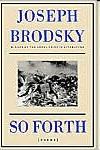
Joseph Brodsky: Poetry in English
Micro-TOC: Books -- originally in English -- translations -- unendorsed
Notes: The translations are accompanied by the titles and first lines of the respective Russian originals, if available. The combined alphabetical index of translations contains only poems translated with Brodsky's participation or approval. It does not include Brodsky's early poems from the book of translations "Elegy to John Donne and other poems" (1967) and other miscellaneous translations not endorsed by the author.
Books (chronological):
- Elegy to John Donne and other poems (1967)
-- an early book of samizdat translations - Selected Poems (1973)
- A Part of Speech (1980)
- To Urania (1988)
-
So Forth (1996)
Alphabetical index of poems
I. Poems originally written in English
- A Martial Law Carol ("One more Christmas ends...") (1980)
- A Postcard ("The country is so populous that polygamists and serial...") (1994)
- A Song ("I wish you were here, dear...") (1989)
- A tale ("In walks the Emperor, dressed as Mars...") (1995)
- Ab Ovo ("Ultimately, there should be a language...") (1996)
- Allenby Road ("At sunset, when the paralyzed street gives up...") (1981)
- Anthem ("Praised be the climate...") (1995)
- Anti-Shenandoah: Two Skits and a Chorus ("Why don't we board a train and go off to Persia?...") (1992)
- At a Lecture ("Since mistakes are inevitable, I can easily be taken...") (1994)
- At the City Dump of Nantucket ("The perishable devours the perishable in broad daylight...") (1995-96)
- Belfast Tune ("Here's a girl from a dangerous town...") (1986)
- Blues ("Eighteen years I've spent in Manhattan...") (1992)
- Bosnia tune ("As you pour yourself a scotch...") (1995?)
- Cafe Trieste: San Francisco ("To this corner of Grant and Vallejo...") (1980)
- Dutch Mistress ("A hotel in whose ledgers departures are more prominent than arrivals...") (1981)
- Elegy ("Whether you fished me bravely out of the Pacific...") (1995)
- Elegy: for Robert Lowell ("In the autumnal blue...") (1977)
- Epitaph for a Centaur ("To say that he was unhappy is either to say too much...") (1988)
- Ex Voto ("Something like a field in Hungary, but without...") (1983)
- Exeter Revisited ("Playing chess on the oil tablecloth at Sparky's...") (1988)
- History of the XX century (A roadshow) (1986, unfinished)
- Galatea Encore ("As though the mercury's under its tongue, it won't...") (1983)
- Infinitive ("Dear savages, though I've never mastered your tongue, free of pronouns and gerunds...") (1994)
- Kolo ("In march the soldiers...") (1995)
- Letter to an Archaeologist ("Citizen, enemy, mama's boy, sucker, utter...") (1983)
- Love Song ("If you were drowning, I'd come to the rescue..." (1995)
- Ode to Concrete ("You'll outlast me, good old concrete...") (1995)
- Reveille ("Birds acquaint themselves with leaves...") (1996)
- Seaward ("Darling, you think it's love, it's just a midnight journey...") (1983)
- "Slave, come to my service!" ("Slave, come to my service!" "Yes, my master. Yes?"...") (1987)
- Song of Welcome ("Here's your mom, here's your dad...") (1992)
- The Berlin Wall Tune ("This is the house destroyed by Jack...") (1980)
- To My Daughter ("Give me another life, and I'll be singing...") (1994)
- Tornfallet ("There is a meadow in Sweden...") (1990/1993)
- Transatlantic ("The last twenty years were good for practically everybody...") (1991)
- Variation in V ("Birds flying high above the retreating army!...") (1983)
II. Translations from Russian
- 1867 ("Nocturnal gardens under slowly ripening mangoes...") -- {1867 ("В ночном саду под гроздью зреющего манго...")}
- 1972 ("Birds don't fly through my skylight nowadays...") (1972) -- {1972 год ("Птица уже не влетает в форточку...")}
- 1 January 1965 ("The Wise Men will unlearn your name...") (1965) -- {1 января 1965 года ("Волхвы забудут адрес твой...")}
- A Christmas Ballad ("In anguish unaccountable...") (1962) -- {Рождественский романс ("Плывет в тоске необъяснимой...")}
- A Footnote to Weather Forecasts ("A garden alley with statues of hardened mud...") (1986) -- {Примечание к прогнозам погоды ("Аллея со статуями из затвердевшей грязи...")}
- A Halt in the Desert ("So few Greeks live in Leningrad today...") (1966) -- {Остановка в пустыне ("Теперь так мало греков в Ленинграде...")}
- A Letter in a Bottle ("Forward, it seems, is where mouth and nose...") (1965) -- {Письмо в бутылке ("То, куда вытянут нос и рот...")}
- "A list of some observations. In a corner, it's warm..." -- {"Это -- ряд наблюдений. В углу -- тепло..."}
- "A navy-blue dawn in a frosted pane..." -- {"Темно-синее утро в заиндевевшей раме..."}
- A Photograph ("We lived in a city tinted the color of frozen vodka...") (1994) -- {"Мы жили в городе цвета окаменевшей водки..."}
- A Polar Explorer ("All the huskies are eaten. There is no space...") (1977) -- {Полярный исследователь ("Все собаки съедены. В дневнике...")}
- A Prophecy ("We'll go and live together by the shore...") (1965) -- {Пророчество ("Мы будем жить с тобой на берегу...")}
- "A second Christmas by the shore..." (Yalta, 1971) -- {"Второе Рождество на берегу..."}
- A Slice of Honeymoon ("Never, never forget...") (1963) -- {Ломтик медового месяца ("Не забывай никогда...")}
- A Song to No Music ("When you recall me in that land...") (1970) -- {Пенье без музыки ("Когда ты вспомнишь обо мне...")}
- A Winter Evening in Yalta ("He has a sear Levantine face, its pock...") (January 1969) -- {Зимним вечером в Ялте ("Сухое левантинское лицо...")}
- Adieu, Mademoiselle Véronique ("If I end my days in the shelter of dove-wings...") (1967) -- {Прощайте, мадемуазель Вероника ("Если кончу дни под крылом голубки...")}
- Aeneas and Dido ("The great man stared out through the open window...") (1969) -- {Дидона и Эней ("Великий человек смотрел в окно...")}
- After Us ("After us, it is certainly not the flood...") (1994) -- {"После нас, разумеется, не потоп..."}
- Afterword ("The years are passing. On the palace's pumice facade appears...") (1986) -- {Послесловие ("Годы проходят. На бурой стене дворца...")}
- Almost an Elegy ("In days gone by I too have waited out...") (Autumn 1968) -- {Почти элегия ("В былые дни и я пережидал...")}
- An Admonition ("Trekking in Asia, spending nights in odd dwellings, in...") (1986) -- {Назидание ("Путешествуя в Азии, ночуя в чужих домах...")}
- "An autumn evening in the modest square..." (1972) -- {"Осенний вечер в скромном городке..."}
- "and when "the future" is uttered, swarms of mice..." (1975) -- {"и при слове "грядущее" из русского языка..."}
- Angel ("A white, pure-cotton angel...") (1992) -- {Ангел ("Белый хлопчатобумажный ангел...")}
- Anno Domini ("The provinces are celebrating Christmas...") (Palanga, 1968) -- {Anno Domini ("Провинция справляет Рождество...")}
- "As for the stars, they are always on..." (1975) -- {"Что касается звезд, то они всегда..."}
- At Karel Weilink's Exhibition ("Nearly a landscape. The full figure count...") (1984) -- {На выставке Карла Вейлинка ("Почти пейзаж. Количество фигур...")}
- August Rain ("In broad daylight it starts to get dark with breathless...") (1988) -- {Дождь в августе ("Среди бела дня начинает стремглав смеркаться, и...")}
- Autumn in Norenskaya ("We return from the field. The wind...") (1965) -- {Осень в Норенской ("Мы возвращаемся с поля. Ветер...")}
- Axiom ("The world was wrought of a mixture of dirt, water, fire...") (1990) -- {"Мир создан был из смешенья грязи, воды, огня..."}
- Brise Marine ("Dear, I ventured out of the house late this evening, merely...") (1989) -- {"Дорогая, я вышел сегодня из дому поздно вечером..."}
- Cappadocia ("A hundred and forty thousand warriors of Mithridates Ponticus...") (1992) -- {Каппадокия ("Сто сорок тысяч воинов Понтийского Митридата...")}
- Centaurs I ("They briskly bounce out of the future and having cried "Futile!"...") -- {Кентавры II ("Они выбегают из будущего и, прокричав "напрасно!"...")}
- Centaurs II ("Part ravishing beauty, part sofa, in the vernacular---Sophie...") -- {Кентавры I ("Наполовину красавица, наполовину софа', в просторечьи -- Со'фа...")}
- Centaurs III ("A marble-white close-up of the past-cum-future hybrid...") -- {Кентавры III ("Помесь прошлого с будущим, данная в камне, крупным...")}
- Centaurs IV ("The instep-shaped landscape, the shade of a jackboot, with nothing moving...") (1988) -- {Кентавры IV ("Местность цвета сапог, цвета сырой портянки...")}
- Clouds ("Ah, summer clouds...") (1989) -- {Облака ("О, облака...")}
- Constancy ("Constancy is an evolution of one's living quarters into...") (1989) -- {Элегия ("Постоянство суть эволюция принципа помещенья...")}
- Daedalus in Sicily ("All his life he was building something, inventing something...") (1993) -- {Дедал в Сицилии ("Всю жизнь он что-нибудь строил, что-нибудь изобретал...")}
- December 24, 1971 ("When it's Christmas we're all of us magi...") (1972) -- {24 декабря 1971 года ("В Рождество все немного волхвы...")}
- December in Florence ("The doors take in air, exhale steam; you, however, won't...") (1976) -- {Декабрь во Флоренции ("Двери вдыхают воздух и выдыхают пар; но...")}
- Eclogue IV: Winter ("In winter it darkens the moment lunch is over...") (1977) -- {Эклога 4-я (зимняя) ("Зимой смеркается сразу после обеда...")}
- Eclogue V: Summer ("I hear you again, mosquito hymn of summer!...") (1981) -- {Эклога 5-я (летняя) ("Вновь я слышу тебя, комариная песня лета!...")}
- Einem alten Architekten in Rom ("Let's take a carriage -- if indeed a shade...") (1964) -- {Einem alten Architekten in Rom ("В коляску -- если только тень...")}
- Elegy ("About a year has passed. I've returned to the place of the battle...") (1985) -- {Элегия ("Прошло что-то около года. Я вернулся на место битвы...")}
- Elegy ("Sweetheart, losing your looks, go to live in a village...") (1992) -- {"Подруга, дурнея лицом, поселись в деревне..."}
- Elegy for John Donne ("John Donne has sunk in sleep... All things beside...") (1963) -- { Большая элегия Джону Донну ("Джон Донн уснул, уснуло все вокруг...")}
- Encyclopedia Entry ("Magnificent and beggar land...") (1975) -- {Заметка для энциклопедии ("Прекрасная и нищая страна...")}
- Enigma for an Angel ("Dreams rock the blanket-universe...") (1962) -- {Загадка ангелу ("Мир одеял разрушен сном...")}
- Evening ("Snow had sifted through cracks...") (1965) -- {Зимним вечером на сеновале ("Снег сено запорошил...")}
- "Exhaustion now is a more frequent guest..." (1960) -- {"Теперь все чаще чувствую усталость..."}
- Fin de Siecle ("The century will soon be over, but sooner it will be me...") (1989) -- {Fin de Siecle ("Век скоро кончится, но раньше кончусь я...")}
- Flourish ("O if the birds sang while the clouds felt bored by singing...") (1994) -- {"О если бы птицы пели и облака скучали..."}
- Folk Tune ("It's not that the Muse feels like clamming up...") (1980) -- {"То не Муза воды набирает в рот..."}
- "From nowhere with love the enth of Marchember sir..." -- {"Ниоткуда с любовью, надцатого мартобря..."}
- From The School Anthology: Albert Frolov ("Albert Frolov loved silence as a boy...") (1969) -- {Из "Школьной антологии" ("Альберт Фролов, любитель тишины...")}
- Gorbunov and Gorchakov ("So, what'd you dream of this time, Gorbunov?"...") (1968) -- {Горбунов и Горчаков ("Ну, что тебе приснилось, Горбунов?"...")}
- Homage to Chekhov ("Sunset clings to the samovar, abandoning the veranda...") (1993) -- {Посвящается Чехову ("Закат, покидая веранду, задерживается на самоваре...")}
- Homage to Girolamo Marcello ("Once in winter I, too, sailed in...") (1988) -- {Посвящается Джироламо Марчелло ("Однажды я тоже зимою приплыл сюда...")}
- Homage to Yalta ("The story to be told below is truthful...") (1969) -- {Посвящается Ялте ("История, рассказанная ниже...")}
- "I recognize this wind battering the limp grass..." (1975) -- {"Узнаю этот ветер, налетающий на траву..."}
- I Sit by the Window ("I said fate plays a game without a score...") (1971) -- {"Я всегда твердил, что судьба -- игра..."}
- "I threw my arms about those shoulders, glancing..." -- {"Я обнял эти плечи и взглянул..."}
- "I was born and grew up in the Baltic marshland..." (1975) -- {"Я родился и вырос в балтийских болотах, подле..."}
- "If anything's to be praised, it's most likely how..." -- {"Если что-нибудь петь, то перемену ветра..."}
- In England (Brighton Rock) ("And so you are returning, livid flush of early dusk. The chalk...") (1976) -- {В Англии ("Ты возвращаешься, сизый цвет ранних сумерек. Меловые...")}
- In Front of Casa Marcello ("The sun's setting, and the corner bar bangs its shutters...") (1995) -- {С натуры ("Солнце садится, и бар на углу закрылся...")}
- In Italy ("I, too, once lived in a city whose cornices used to court...") (1985) -- {В Италии ("И я когда-то жил в городе, где на домах росли...")}
- In Memoriam ("The thought of you is receding like a chambermaid given notice...") (1985 ) -- {"Мысль о тебе удаляется, как разжалованная прислуга..."}
- In Memory of Clifford Brown ("It's not the color blue, it's the color cold...") (1993) -- {Памяти Клиффорда Брауна ("Это -- не синий цвет, это -- холодный цвет...")}
- In Memory of My Father: Australia ("You arose---I dreamt so last right---and left for...") (1989) -- {Памяти отца: Австралия ("Ты ожил, снилось мне, и уехал...")}
- In the Lake District ("In those days, in a place where dentists thrive...") (Ann Arbor, 1973) -- {В озерном краю ("В те времена в стране зубных врачей...")}
- "In the little town out of which death sprawled over the classroom map..." (1975) -- {"В городке, из которого смерть расползалась по школьной карте..."}
- "In villages God does not live only..." (1964) -- {"В деревне Бог живет не по углам..."}
- Ischia in October ("Once a volcano here belched with zest...") (1993) -- {Иския в октябре ("Когда-то здесь клокотал вулкан...")}
- Kellomaki ("Dumped in the dunes snatched from the witless Finns...") (1985 ) -- {Келломяки ("Заблудившийся в дюнах, отобранных у чухны...")}
- Lagoon ("Down in the lobby three elderly women, bored...") (1973) -- {Лагуна ("Три старухи с вязаньем в глубоких креслах...")}
- Letters from the Ming Dynasty ("Soon it will be thirteen years since the nightingale...") (1977) -- {Письма династии Минь ("Скоро тринадцать лет, как соловей из клетки...")}
- Letters to a Roman Friend ("Now it's windy and the waves are running crisscross...") (1972) -- {Письма римскому другу ("Нынче ветрено и волны с перехлестом...")}
- Lines on the Winter Campaign, 1980 ("A bullet's velocity in low temperatures...") (1980) -- {Стихи о зимней кампании 1980-го года ("Скорость пули при низкой температуре...")}
- Lithuanian Divertissement ("A modest little country by the sea...") (1971) -- {Литовский дивертисмент ("Вот скромная приморская страна...")}
- Lithuanian Nocturne ("Having roughed up the waters...") (1974) -- {Литовский ноктюрн ("Взбаламутивший море...")}
- Lullaby ("Birth I gave you in a desert...") (December 1992) -- {Колыбельная ("Родила тебя в пустыне...")}
- Lullaby of Cape Cod ("The eastern tip of the Empire dives into night...") (1975) -- {Колыбельная Трескового Мыса ("Восточный конец Империи погружается в ночь. Цикады...")}
- May 24, 1980 ("I have braved, for want of wild beasts, steel cages...") (1980) -- {"Я входил вместо дикого зверя в клетку..."}
- MCMXCIV ("Lousy times: nothing to steal and no one to steal from...") (1994) -- {MCMXCIV ("Глупое время: и нечего, и не у кого украсть...")}
- MCMXCV ("The clowns are demolishing the circus. The elephants have run off to India...") (1995) -- {"Клоуны разрушают цирк. Слоны убежали в Индию..."}
- Merida ("A fan of palms surrounding...") -- {Мерида ("Коричневый город. Веер...")}
- Mexican Divertimento (Cuernavaca) ("Beneath the tree where M., the Frenchmen's pet...") -- {Мексиканский дивертисмент (Гуернавака) ("В саду, где М., французский протеже...")}
- Mexican Romancero ("Good old Mexico City...") -- {Мексиканский романсеро ("Кактус, пальма, агава...")}
- Minefield Revisited ("You, guitar-shaped affair with tousled squalor...") (1978) -- {"Ты, гитарообразная вещь со спутанной паутиной..."}
- Nativity ("No matter what went on around them; no matter...") (December 1990) -- {"Не важно, что было вокруг, и не важно..."}
- Nature Morte ("People and things crowd in...") (1971) -- {Натюрморт ("Вещи и люди нас...")}
- Nature Morte ("People and things crowd in...") (1971) -- {Натюрморт ("Вещи и люди нас...")}
- Near Alexandria ("The concrete needle is shooting its...") (1982) -- {В окрестностях Александрии ("Каменный шприц впрыскивает героин...")}
- "Near the ocean, by candlelight. Scattered farms..." (1975) -- {"Около океана, при свете свечи; вокруг..."}
- New Life ("Imagine that war is over, that peace has resumed its reign...") (1988) -- {Новая жизнь ("Представь, что война окончена, что воцарился мир...")}
- New Stanzas to Augusta ("September came on Tuesday...") (1964) -- {Новые стансы к Августе ("Во вторник начался сентябрь...")}
- North Baltic ("When a blizzard powders the harbor, when the creaking pine...") (1975) -- {Шведская музыка ("Когда снег заметает море и скрип сосны...")}
- North of Delphi ("The plight of a pawn tells the king what it's all about...") (1989) -- {Примечания папоротника ("По положению пешки догадываешься о короле...")}
- "Not that I am losing my grip: I am just tired of summer..." (1975) -- {"Я не то что схожу с ума, но устал за лето..."}
- "Now that I've walled myself off from the world..." (1966) -- {"Сумев отгородиться от людей..."}
- Nunc Dimittis ("When Mary first came to present the Christ Child...") (February 16, 1972) -- {Сретенье ("Когда она в церковь впервые внесла...")}
- Nunc dimittis ("When Mary first came to present the Christ Child...") (16 February 1972) -- {Сретенье ("Когда она в церковь впервые внесла...")}
- October Tune ("A stuffed quail...") (1968) -- {Октябрьская песня ("Чучело перепёлки...")}
- Odysseus to Telemachus ("My dear Telemachus...") (1972) -- {Одиссей Телемаку ("Мой Телемак...")}
- Odysseus to Telemachus ("My dear Telemachus...") (1972) -- {Одиссей Телемаку ("Мой Телемак...")}
- On Love ("Twice I woke up tonight and wandered to...") (1971) -- {Любовь ("Я дважды пробуждался этой ночью...")}
- On the Death of Zhukov ("Columns of grandsons, stiff at attention...") (London, 1974) -- {На смерть Жукова ("Вижу колонны замерших звуков...")}
- On Washerwoman Bridge ("On Washerwoman Bridge, where you and I...") (1968) -- {Прачечный мост ("На Прачечном мосту, где мы с тобой...")}
- Persian Arrow ("Your wooden shaft has vanished; so has the body...") (1993) -- {Персидская стрела ("Древко твое истлело, истлело тело...")}
- Plato Elaborated ("I should like, Fortunatus, to live in a city where a riv...") (1977) -- {Развивая Платона ("Я хотел бы жить, Фортунатус, в городе, где река...")}
- Polonaise: A Variation ("Autumn in your hemisphere whoops cranes and owls...") (1981) -- {Полонез: вариация ("Осень в твоем полушарьи кричит "курлы"...")}
- Porta San Pancrazio ("The bees haven't buzzed away, nor has a horseman galloped...") (1989) -- {"Пчелы не улетели, всадник не ускакал. В кофейне..."}
- Portrait of Tragedy ("Let's look at the face of tragedy. Let's see its creases...") (1991) -- {Портрет трагедии ("Заглянем в лицо трагедии. Увидим ее морщины...")}
- Post Aetatem Nostram ("`The Empire is a country for dull fools.'...") (20 October 1970) -- {Post aetatem nostram ("Империя -- страна для дураков...")}
- Postcard from Lisbon ("Monuments to events that never took place: to bloody...") (1988) -- {Открытка из Лиссабона ("Монументы событиям, никогда не имевшим места...")}
- Postscriptum ("How sad that my life has not come to mean...") (September 1967) -- {Postscriptum ("Как жаль, что тем, чем стало для меня...")}
- "Quilt-jacketed, a tree-surgeon..." (18 January 1964) -- {"Садовник в ватнике, как дрозд..."}
- "Refusing to catalogue all of one's woes..." (June 1967) -- {"Отказом от скорбного перечня -- жест..."}
- Roman Elegies ("The captive mahogany of a private Roman...") (1981) -- {Римские элегии ("Пленное красное дерево частной квартиры в Риме...")}
- Sadly and Tenderly ("They served us noodles one more time, and you...") (1964) -- {С грустью и с нежностью ("На ужин вновь была лапша, и ты...")}
- San Pietro ("Three weeks now and the fog still clings to the white...") (Venice, 1978) -- {Сан-Пьетро ("Третью неделю туман не слезает с белой...")}
- September the First ("The day was called, simply, `September first'...") (1967) -- {1 сентября 1939 года ("День назывался "первым сентября"...")}
- Seven Strophes ("I was but what you'd brush...") (1981) -- {"Я был только тем, чего..."}
- Sextet ("An eyelid is twitching. From the open mouth...") (1976) -- {Квинтет ("Веко подергивается. Изо рта...")}
- Six Years Later ("So long had life together been that now...") (1969) -- {Шесть лет спустя ("Так долго вместе прожили, что вновь...")}
- So Forth ("Summer will end. September will come. Once more it's okay to shoot...") (1989) -- {"Кончится лето. Начнется сентябрь. Разрешат отстрел..."}
- Sonnet ("Great-hearted Hector has been speared to death...") (1961) -- {Сонет ("Великий Гектор стрелами убит...")}
- Sonnet ("Once more we're living by the Bay of Naples...") (1962) -- {Сонет ("Мы снова проживаем у залива...")}
- Sonnet ("The month of January has flown past...") (1962) -- {Сонет ("Прошел январь за окнами тюрьмы...")}
- Spring Season of Muddy Roads ("The rain has turned the roads...") (1964) -- {В распутицу ("Дорогу развезло...")}
- Stanzas ("Let our farewell be silent...") (March 1968) -- {Строфы ("На прощанье -- ни звука...")}
- Star of the Nativity ("In the cold season, in a locality accustomed to heat more than...") (December 1987) -- {Рождественская звезда ("В холодную пору, в местности, привычной скорей к жаре...")}
- Strophes ("Like a glass whose imprint...") (1978) -- {Строфы ("Наподобье стакана...")}
- Taps ("I've been reproached for everything save the weather...") (1994) -- {"Меня упрекали во всём, окромя погоды..."}
- "That evening, sprawling by an open fire..." (1961) -- {"В тот вечер возле нашего огня..."}
- The Bust of Tiberius ("All hail to you, two thousand years too late...") (1981) -- {Бюст Тиберия ("Приветствую тебя две тыщи лет...")}
- The Butterfly ("Should I say that you're dead?...") (1973) -- {Бабочка ("Сказать, что ты мертва?...")}
- The Candlestick ("The satyr, having quit the bronzy stream...") (1968) -- {Подсвечник ("Сатир, покинув бронзовый ручей...")}
- "The classical ballet, let's say, is beauty's keep..." (1976) -- {"Классический балет есть замок красоты..."}
- "The days glide over me..." (June 1964) -- {"Дни бегут надо мной..."}
- The End of a Beautiful Era ("Since the stern art of poetry calls for words, I, morose...") (Leningrad, 1969) -- {Конец прекрасной эпохи ("Потому что искусство поэзии требует слов...")}
- The Fifth Anniversary ("A falling star, or worse, a planet (true or bogus)...") (1977) -- {Пятая годовщина ("Падучая звезда, тем паче -- астероид...")}
- "The fire, as you can hear, is dying down..." (1962) -- {"Огонь, ты слышишь, начал угасать..."}
- The Fly ("While you were singing, fall arrived...") (1986) -- {Муха ("Пока ты пела, осень наступила...")}
- The Fountain ("From the lion's jaws...") (December 1967) -- {Фонтан ("Из пасти льва...")}
- The Funeral of Bobo ("Bobo is dead, but don't take off your hat...") (1972) -- {Похороны Бобо ("Бобо мертва, но шапки недолой...")}
- The Hawk's Cry in Autumn ("Wind from the northwestern quarter is lifting him high above...") (1975) -- {Осенний крик ястреба ("Северозападный ветер его поднимает над...")}
- "The Laocoon of a tree, casting the mountain weight..." -- {"Деревянный лаокоон, сбросив на время гору с..."}
- The New Jules Verne ("A perfect line of horizon. Without a blot. A swanky...") (1977) -- {Новый Жюль Верн ("Безупречная линия горизонта, без какого-либо изъяна...")}
- "The North buckles metal, glass it won't harm..." -- {"Север крошит металл, но щадит стекло..."}
- The Residence ("An attractive mansion on the avenue of Sardanapalus...") (1983) -- {Резиденция ("Небольшой особняк на проспекте Сарданапала...")}
- The Rustle of Acacias ("Summertime, the cities empty. Saturdays, holidays...") (1977) -- {Шорох акации ("Летом столицы пустеют. Субботы и отпуска...")}
- "The tenant finds his new house wholly strange..." (1962) -- {"Все чуждо в доме новому жильцу..."}
- The Thames at Chelsea ("November. The sun, having risen on an empty stomach...") (1974) -- {Темза в Челси ("Ноябрь. Светило, поднявшееся натощак...")}
- "The trees in my window, in my wooden-framed window..." (October 1964) -- {"Деревья в моем окне, в деревянном окне..."}
- "There is always a possibility left -- to let..." -- {"Всегда остается возможность выйти из дому на..."}
- To a Certain Poetess ("I have a touch of normal classicism...") (September 1965) -- {Одной поэтессе ("Я заражен нормальным классицизмом...")}
- To a Friend: In Memoriam ("It's for you whose name's better omitted---since for them it's no arduous task...") (1973) -- {На смерть друга ("Имяреку, тебе, -- потому что не станет за труд...")}
- To a Tyrant ("He used to come here till he donned gold braid...") (1972) -- {Одному тирану ("Он здесь бывал: еще не в галифе...")}
- To Evgeny ("I've been in Mexico, clambered up the pyramids...") -- {К Евгению ("Я был в Мексике, взбирался на пирамиды...")}
- To Lycomedes on Scyros ("I quit this city, as once Theseus quit...") (1967) -- {По дороге на Скирос ("Я покидаю город, как Тезей...")}
- To Urania ("Everything has its limit, including sorrow...") (1981) -- {К Урании ("У всего есть предел: в том числе у печали...")}
- Torso ("If suddenly you walk on grass turned stone...") (1973) -- {Торс ("Если вдруг забредаешь в каменную траву...")}
- Tsushima Screen ("The perilous yellow sun follows with its slant eyes...") (1978) -- {"Восходящее желтое солнце следит косыми..."}
- Twenty Sonnets to Mary Queen of Scots ("Mary, I call them pigs, not Picts, those Scots...") (1974) -- {20 сонетов к Марии Стюарт ("Мари, шотландцы все-таки скоты...")}
- Two Hours in an Empty Tank ("I am an anti-fascist anti-Faust...") (September 1965) -- {Два часа в резервуаре ("Я есть антифашист и антифауст...")}
- Venetian Stanzas I ("The wet hitching post of the quay: a sulky hackney...") (1982) -- {Венецианские строфы (1) ("Мокрая коновязь пристани. Понурая ездовая...")}
- Venetian Stanzas II ("A sleep-crumpled cloud unfurls mealy mizzens...") (1982) -- {Венецианские строфы (2) ("Смятое за ночь облако расправляет мучнистый парус...")}
- Venice: Lido ("A rusty Romanian tanker, wallowing out in the azure...") (1989) -- {Лидо ("Ржавый румынский танкер, барахтающийся в лазури...")}
- Verses in April ("Once again this past winter...") (April 1969) -- {Стихи в апреле ("В эту зиму с ума...")}
- Verses on the Death of T. S. Eliot ("He died at start of year, in January...") (12 January 1965) -- { На смерть Т. С. Элиота ("Он умер в январе, в начале года...")}
- Vertumnus ("I met you the first time ever in latitudes you'd call foreign...") (1990) -- {Вертумн ("Я встретил тебя впервые в чужих для тебя широтах...")}
- Via Funari ("Ugly gargoyles peek out of your well-lit window..." (1995) -- {На виа Фунари ("Странные морды высовываются из твоего окна...")}
- View from the Hill ("Here is your frozen city cut into marble cubes...") (1992) -- {Вид с холма ("Вот вам замерзший город из каменного угла...")}
- View with a Flood ("A somewhat familiar landscape, currently flooded. Currently...") (1993) -- {"Не слишком известный пейзаж, улучшенный наводнением..."}
- Wagon Train ("The thicker the shadows spill...") (Tarusa, February 1964) -- {Обоз ("Скрип телег тем сильней...")}
- "When I embraced these shoulders, I beheld..." (1962) -- {"Я обнял эти плечи и взглянул..."}
- "You'll flutter, robin redbreast, from those three..." (24 May 1964) -- {Малиновка ("Ты выпорхнешь, малиновка, из трех...")}
- "You're coming home again. What does that mean?..." (1961) -- {"Воротишься на родину. Ну что ж..."}
- "You've forgotten that village lost in the rows and rows..." (1975) -- {"Ты забыла деревню, затерянную в болотах..."}
III. Translations not endorsed by the author
Note: These translations appeared either in books published before 1972, or on the Web after 1996, and have not been appraised by J. Brodsky; quality of the translation varies but is generally lower than that of published books (above).
- A Christmas romance -- {Рождественский романс ("Плывет в тоске необъяснимой...")}
- `A gardener in a quilted coat...' -- {"Садовник в ватнике, как дрозд..."}
- A Jewish cemetery by Leningrad -- {"Еврейское кладбище около Ленинграда..."}
- A memorial to Pushkin -- {Памятник Пушкину ("И тишина...")}
- A riddle for an angel (1964) -- {Загадка ангелу ("Мир одеял разрушен сном...")}
- Cockerels -- {Петухи ("Звёзды ещё не гасли...")}
- Dialogue -- {Диалог ("Там он лежит, на склоне...")}
- Earth -- {?}
- Elegy to John Donne -- {Большая элегия Джону Донну ("Джон Донн уснул, уснуло все вокруг...")}
- `Eternal fight...' -- {"И вечный бой..."}
- `Farewell...' -- {"Прощай..."}
- Fishes -- {Рыбы зимой ("Рыбы зимой живут...")}
- From a School Anthology ("E. Larionova. Brunette. A colonel's...") -- {Из "Школьной антологии" ("Э. Ларионова. Брюнетка. Дочь...")}
- "From nowhere with love, on the -eenth of Marchember..." -- {"Ниоткуда с любовью, надцатого мартобря..."}
- "From nowhere with love as of -- teen Febromay..." -- {"Ниоткуда с любовью, надцатого мартобря..."}
- Funeral of Bobo ("Bobo is dead. But do not leave your seat!...") -- {Похороны Бобо ("Бобо мертва, но шапки недолой...")}
- Gladiators -- {Гладиаторы ("Простимся...")}
- Hills -- {Холмы ("Вместе они любили...")}
- `I can visit, once more...' -- {От окраины к центру ("Вот я вновь посетил...")}
- `I kissed those shoulders...' -- {"Я обнял эти плечи и взглянул..."}
- "I threw my arms about those shoulders, glancing..." -- {"Я обнял эти плечи и взглянул..."}
- Letters to the roman friend ("Now is windy and the waves are cresting over...") -- {Письма римскому другу ("Нынче ветрено и волны с перехлестом...")}
- Love ("Twice I awoke this night, and went...") -- {Любовь ("Я дважды пробуждался этой ночью...")}
- Moscow Carol ("In such an inexplicable blue...") -- {Рождественский романс ("Плывет в тоске необъяснимой...")}
- On the 100th Anniversary of Anna Akhmatova ("The fire and the page, the hewed hairs and the swords...") -- {На столетие Анны Ахматовой ("Страница и огонь, зерно и жернова...")}
- Pilgrims -- {Пилигримы ("Мимо ристалищ, капищ...")}
- The artist -- { Художник ("Он верил в свой череп...")}
- `The black firmament was lighter than those feet...' -- {"В тот вечер возле нашего огня..."}
- The Funeral of Bobo ("Bobo is dead, but don't take off your hat...") (January-March 1972) -- {Похороны Бобо ("Бобо мертва, но шапки недолой...")}
- The garden -- { Сад ("О, как ты пуст и нем!...")}
- The statue -- {Памятник ("Поставим памятник...")}
- `The wheelwright had died...' (1964) -- {"Колесник умер, бондарь..."}
- `They tell me that today it's time to leave...' -- {"Мне говорят, что нужно уезжать..."}
- To A. A. A. -- {"Когда подойдет к изголовью..."}
- To the new tenant -- {"Все чуждо в доме новому жильцу..."}
- Towards the garden fence -- {К садовой ограде ("Снег в сумерках кружит, кружит...")}
- Two Hours in Reservoir ("I am an anti-fascist... anti-Faust...") -- {Два часа в резервуаре ("Я есть антифашист и анти-Фауст...")}
- Verses about blind musicians -- {Стихотворение о слепых музыкантах ("Слепые блуждают ночью...")}
- Verses under an epigraph -- {Стихи под эпиграфом ("Каждый пред Богом...")}
- `Why is it we must yet again change places?..' -- {"Зачем опять меняемся местами..."}
- Windows -- { Окна ("Дом на отшибе сдерживает грязь...")}
- `You've finally come home...' -- {"Воротишься на родину. Ну что ж..."}
Источник: http://www.geocities.com/Athens/8926/Brodsky/poetry_e/
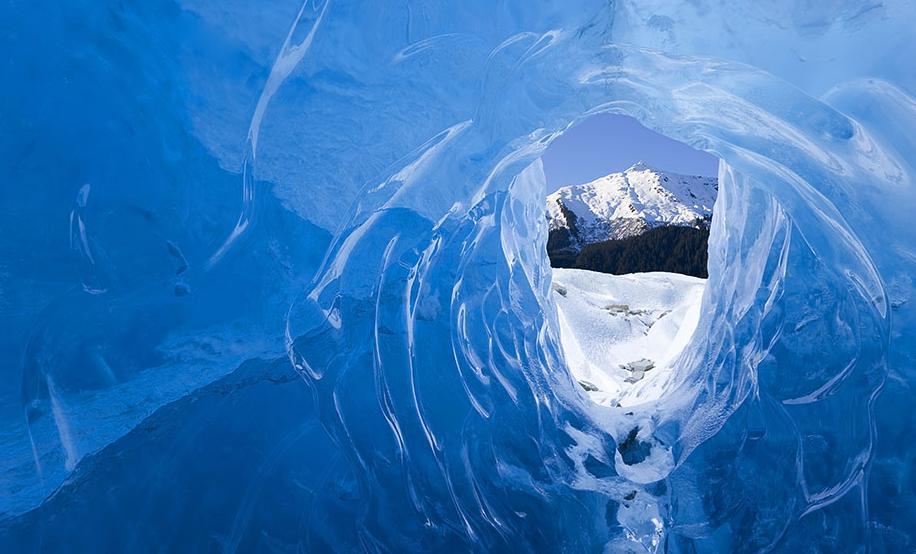
Биография Бродского, часть 1 Биография Бродского, часть 2 Биография Бродского, часть 3
Карта сайта: 1, 2, 3, 4, 5, 6, 7, 8, 9, 10, 11, 12, 13, 14, 15.Деград




